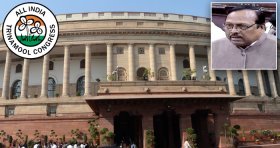August 6, 2018
Sukhendu Sekhar Roy on the Criminal Law (Amendment) Bill, 2018

FULL TRANSCRIPT
Now Sir, whatever Mr Rajiv Gowda, Roopa Ji and Vandana Ji have said, I am contradicting their views and expressions. However, I would like to make a few points as my good friend Mr Ramnath Krishnan has rightly pointed out that in Clause IV, V and VI, the expressions which have been used as women under 16 years of age, women under 12 years of age and women under 16 years of age etc.
Now Sir according to the Oxford English dictionary, a woman’s definition is such that ‘an adult human female is a woman’. Now definition of girls: ‘a female child’, definition of child: ‘a young human being below the age of puberty or below the legal age of majority’. Keeping all these expressions and definitions provided for in the English dictionary, I think the word ‘woman’ should be replaced by appropriate words. And there are certain more legal shortcomings in this Bill and the request, that has been made by Mr Gowda, I support that the Bill should go to the Select Committee because there are so many shortcomings.
Now Sir, for example, my personal view on this Bill is that in case of rape below 12 years, the punishment is minimum 20 years and maximum life imprisonment or death, whereas in case of below 16 years and above 12 years and 16 years and above, the punishment is lesser. Why? If the crime is same, then why should the punishment be less? That should not be. If we want to initiate a deterrent law, somebody may agree or not agree, reports are published in a routine manner that as if India is a rape country, which is not true. But no doubt about it that the incidents of rape are increasing alarmingly in different parts of the country.
Therefore, Sir, my humble submission to the government is that there are certain other things to be considered. Suppose today, we pass this Bill, what will be the effect subsequently? This Parliament passes so many Bills but whether the implementation part is taken care of adequately is the moot question. How many cases are pending in the courts? In the High Courts, 23% of cases are pending for over 10 years, 29% of all cases are pending for 2-5 years in High Courts, in subordinate courts over 8% cases are pending for over 10 years, maximum of 47% are pending for 2 years in subordinate courts. Total number of cases pending in lower courts are 1.2 crores. I’m not giving the figure of High Courts. How many vacancies are there in the courts? We require more courts and judges, otherwise we will pass this Law and it will be never be implemented.
It is long drawn process, whether we provide that within 2 months enquiry has to be completed, or within six months the case has to be disposed… Whatever, this will have no impact because there will be no judge to decide upon them. What is the case of Kolkata High Court? The highest proportion of vacancies amongst the High Courts, where sanctioned strength is over 10 judges, is in Kolkata. That is 58% vacancies. Total number of vacancies of judges are 42 highest in the country followed by Karnataka. So these are the alarming situations in the courts, they don’t have the infrastructure, they don’t have the judges and cases are mounting and we are passing Laws. There is no implementation, and everybody is raising fingers at the parliamentarians and at the government. What will government do? Unless these things are improved this (Bill) will be a myth. So my suggestion is let all these points be referred to the Select Committee.
Sir, that would be the best thing. Thank You.
